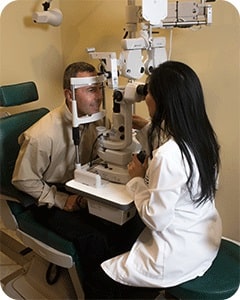Eye Exams at Age 40: Why This Milestone Matters for Your Vision

Turning 40 is a significant milestone in many ways — and your vision is no exception. Even if you've had perfect eyesight your entire life, age-related changes to your eyes often begin around this time. That's why comprehensive eye exams become even more important as you hit your 40s.
Here’s what you need to know about eye exams at age 40 and how they can help safeguard your vision for the years ahead.
Why Age 40 Is a Critical Point for Eye Health
Around the age of 40, many people begin to notice subtle but real changes in their vision. You might find yourself holding reading materials farther away, experiencing eye fatigue more often, or having trouble focusing on objects up close — a condition called presbyopia, which is a natural part of aging.
Although these changes are usually not signs of serious disease, they can be inconvenient and impact your daily life. More importantly, age 40 is also when the risk of developing certain eye conditions starts to increase.
What Happens During an Eye Exam at 40?
A comprehensive eye exam at 40 goes beyond just checking your vision with a standard eye chart. Your eye care provider will assess several important aspects of your eye health:
1. Visual Acuity Testing
This measures how clearly you can see at various distances.
2. Refraction Assessment
This determines your exact prescription for eyeglasses or contact lenses, if needed.
3. Eye Pressure Check (Tonometry)
This helps screen for glaucoma, a condition that can lead to vision loss without noticeable symptoms in the early stages.
4. Retinal Examination
Your doctor will examine the back of your eye (the retina) to check for early signs of issues like diabetic retinopathy, macular degeneration, or retinal detachment.
5. Slit-Lamp Exam
This allows for a detailed look at the front structures of the eye — the cornea, iris, and lens — to spot signs of cataracts or other conditions.
Common Eye Conditions That May Begin at 40+
- Presbyopia – Difficulty seeing things up close
- Cataracts – Clouding of the lens, typically developing slowly
- Glaucoma – Increased pressure in the eye that can lead to optic nerve damage
- Age-related macular degeneration (AMD) – Affects central vision
- Diabetic retinopathy – Damage to blood vessels in the retina from diabetes
Early detection of these conditions through routine eye exams can make a significant difference in treatment outcomes and long-term vision health.
How Often Should You Get an Eye Exam After 40?
If you have no vision problems or risk factors, the American Academy of Ophthalmology recommends getting a comprehensive eye exam at 40, followed by exams every 2–4 years. However, you may need more frequent exams if you:
- Have a family history of eye diseases
- Wear glasses or contacts
- Have chronic conditions like diabetes or high blood pressure
- Notice changes in your vision
Tips to Maintain Healthy Vision After 40
- Wear sunglasses with UV protection
- Eat a balanced diet rich in leafy greens, omega-3s, and antioxidants
- Quit smoking, which accelerates age-related eye diseases
- Manage chronic conditions such as hypertension and diabetes
- Limit screen time and take regular breaks using the 20-20-20 rule
Conclusion
Your 40s are the perfect time to take proactive steps toward lifelong eye health. Even if you aren’t experiencing symptoms, an eye exam can uncover hidden issues and lay the foundation for clearer, healthier vision as you age. Don’t wait for problems to arise — schedule your comprehensive eye exam and invest in your future sight.
Make your appointment today
To make your appointment, simply give us a call (760)-948-3345 or
or
At Golden Eye Optometry, we view good vision care as front line protection at every age. A routine eye exam can detect more than poor vision. It can shed early light on glaucoma, macular degeneration, cataracts and diabetes.
Information received through Golden Eye Optometry social media channels is for informational purposes only and does not constitute medical advice, medical recommendations, diagnosis, or treatment. Always seek the advice of your eye doctor, physician, or other qualified health provider with any questions you may have regarding a medical condition.